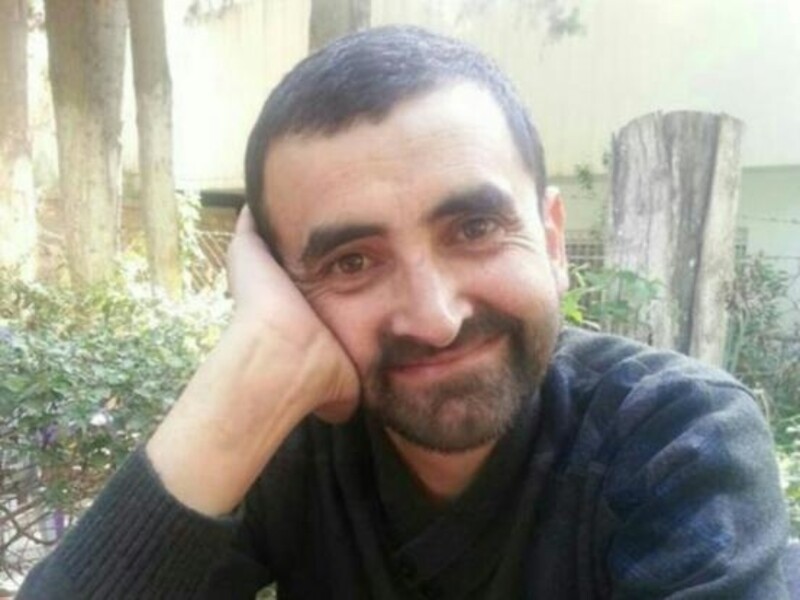Rights and Accountability 9 September 2019

Palestinians protest the death of prisoner Bassam al-Sayih in Israeli detention, outside the office of the International Committee of the Red Cross in Gaza City on 8 September.
APA imagesPalestinian prisoner Bassam al-Sayih died in Israeli detention on Sunday after years of medical neglect.
Al-Sayih, 46, from the occupied West Bank city of Nablus, died at the Yitzhak Shamir Medical Center in Tel Aviv but was held at the Ramle prison clinic for the majority of his detention, according to the Palestinian Prisoners Club.
Al-Sayih was diagnosed with cancer when Israeli occupation forces arrested him on 8 October 2015.
Israeli prison authorities harshly interrogated him and left him without medical care for weeks at the Petah Tikva detention center near Tel Aviv.
“Due to torture, medical negligence and stalling in giving him the medical care he needed, his health deteriorated and led to 80 percent failure in his heart and inability to move or speak,” prisoners rights group Addameer reported.
Al-Sayih’s medical condition worsened over four years of imprisonment and medical neglect, and he was later diagnosed with leukemia, according to the Palestinian Center for Human Rights.
The Palestinian Prisoners Club is holding Israel responsible for the death of al-Sayih “as a result of medical negligence.”
Reason for arrest
Al-Sayih was detained over his alleged involvement in the killing of Israeli settlers Eitam and Naama Henkin in the occupied West Bank on 1 October 2015.
The two settlers were shot dead in their car as they traveled between Itamar and Elon Moreh, two Jewish-only colonies built on land Israel violently seized from Palestinians in violation of international law.
Their four young children were left unharmed.
The killing of the Henkin couple was seen as a revenge attack for Israeli settlers burning alive the Dawabsha family, including 18-month-old Ali Dawabsha, in the occupied West Bank village of Duma a week earlier.
Still, during four years of detention, occupation authorities never granted al-Sayih a trial and he was never sentenced.

Bassam al-Sayih spent years in Israeli and Palestinian Authority prisons. (Palestinian Prisoners Club / Facebook)
PA “security coordination”
Palestinian Authority forces first arrested al-Sayih in 1996 to interrogate him about his brother.
According to the Qassam Brigades, the military wing of Hamas, Bassam al-Sayih was tortured by the PA.
The PA arrested him again in 1998 and in 2001, at the height of the second intifada.
In 2002, Israeli occupation forces arrested Bassam and held him under administrative detention – without charge or trial – for a year and a half.
Shortly after, Bassam’s brother Amjad was arrested by occupation authorities and sentenced to 20 years in prison – likely the product of the so-called “security coordination” of the Palestinian Authority with Israel’s military occupation.
Over the next decade, the PA repeatedly detained, interrogated and tortured Bassam for reasons related to his membership of the Qassam Brigades.
Yet despite the PA’s lengthy record of detaining and allegedly torturing al-Sayih, its current de facto prime minister, Rami Hamdallah, described his death as “a new crime in the record of torture and medical negligence in Israeli prisons and detention centers.”
Meanwhile, PA forces blocked Palestinians marching towards the Beit El checkpoint outside the occupied West Bank city of Ramallah on Monday in protest of al-Sayih’s death: Palestinians in the Gaza Strip held a symbolic funeral for al-Sayih outside the International Committee of the Red Cross offices in Gaza City on Monday: Palestinians protested in Nablus and in the town of al-Bireh, adjacent to Ramallah, as well: Israel is withholding the body of al-Sayih, as well as the bodies of all Palestinian prisoners who died in Israeli detention since the beginning of 2019.Al-Sayih is the third Palestinian to die in Israeli prisons since the beginning of the year.
Nassar Taqatqa, 31, died in Nitzan prison in July, less than a month into his detention.
Human rights organizations held Israel responsible for the death of Taqatqa due to suspected torture.
Faris Baroud died after 28 years in Israeli detention in February.
Baroud, 51, spent the majority of his imprisonment in isolation and died after years of medical neglect.
Hunger strikers
Meanwhile, Palestinian prisoner Huthaifa Halabiya suspended his hunger strike on 5 September after 67 days without food.
Halabiya rejected an offer by Israeli prison authorities to extend his detention by two months if he were to suspend his strike.
Halabiya, 28, from the Palestinian village of Abu Dis near Jerusalem, has been held without charge or trial since 10 June 2018.
This is his fourth detention since 2013, but the first administrative one.
Halabiya has had no contact with his family for most of his strike and imprisonment. He has also never met his daughter, who was born while he was detained.
His health deteriorated severely during his protest, but he refused any medical tests, according to Addameer.
Other Palestinian prisoners remain on hunger strike to protest their administrative detention.





Comments
death by contempt for life
Permalink tom hall replied on
Israel finds new ways to kill. Medical neglect while under indefinite detention without trial may not be an entirely novel method, but it's becoming more widely known and condemned. Condolences to the families of Bassam, Nassar and Faris. These men will not be forgotten. And one day all those held under these torturous conditions will be free. We must all work to bring that day closer.